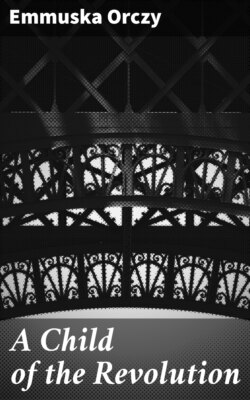Читать книгу A Child of the Revolution - Emmuska Orczy - Страница 7
На сайте Литреса книга снята с продажи.
Chapter 3
ОглавлениеTable of Contents
A blind unreasoning rage, an irresistible thirst for revenge; a black hatred of all those placed in authority; of all those who were rich, or independent, or influential, filled André Vallon's young soul to the exclusion of every other thought and every other aspiration.
He was only fifteen, and in his mind he measured the long years that lay before him in which he could find the means, the power, to be even with those who had inflicted that overwhelming shame upon him. It was not the blows he minded...Heavens above! that lithe, young body of his was inured to every kind of hardship, to every kind of pain. It was not the blows, it was the shame. Talon, who was influential and who was egged on by his wife, had prevailed upon the magistrate to make an order that all the inhabitants of the commune who were not engaged in work were to be present in the market place to see justice done on the young reprobate. And these were still the days when no one dared go against an order, however absurd and however unjust, framed by M. le Substitut du Procureeur Général.
Monseigneur also came in his coach and brought friends to see the spectacle. There were two ladies among them who put up their lorgnettes and stared at the straight, sinewy young body, so like a statue of the Hermes with its slender, perfectly modelled limbs and narrow hips, and its broad shoulders and wide chest, smooth and dark as if cast in bronze.
"But the boy is an Adonis!" one of the ladies exclaimed in ecstasy.
"Quelle horreur!" she exclaimed a moment later when the stripes fell thick and fast on the smooth back she had admired. The days were not yet very far distant when ladies of high degree would crowed on balconies and windows to watch the execution of conspirators who perhaps had been their friends before then.
But for André Vallon, the bitter, humiliating shame!
His mother was waiting for him when he got home. She had prepared a little bit of hot supper for him, to which sympathisers in the village had also contributed: things he liked—a little hot soup, a baked potato, a bit of bread and salts. André ate because he was a young, healthy animal and was hungry, but he never said a word. Silent and sullen, he sat and ate. Not a tear came to those big dark eyes of his, in which there burned a fierce hatred and an overpowering humiliation.
Marianne, of course, said nothing. It was never her way to talk. She saw to it that André had his supper, and when he had finished she took him by the wrist and led him to his little room at the back. She undressed him and washed and dried his poor aching young body; then she wrapped him up in one of her wide gingham skirts which had become soft as silk after many washings, and laid him down on his narrow plank bed with his head resting on an old coat of his father's, which had survived the dispersal of most of the household goods. Before she had finished tucking him up in her wool shawl he was asleep.
She watched for a moment or two the beautiful young face, with the blue-veined lids veiling in sleep the sullen, glowering look of the eyes; stooped and softly touched the moist forehead with her lips. Two heavy tears found their way down her furrowed cheeks; a heavy sigh came though the firm obstinate lips, and slowly she came down on her knees. With clasped hands flung across the bed, she remained kneeling there for some time, praying for guidance, for strength to fight a brave fight with this turbulent young soul, and for power to guide it in the path of rectitude.
This was the year of grace 1782, and Marianne Vallon, in common with many men and women in the land these days, was not blind to the tempest which already was gathering force in every corner of France, framed by the ardour of young enthusiasts with a grievance like her André, or by the greed of profligate agitators, soon to burst in all its fury, sweeping before it all the old traditions, the old beliefs, the old righteousness of this country and its people, and inflicting wounds that it would take centuries to heal.
